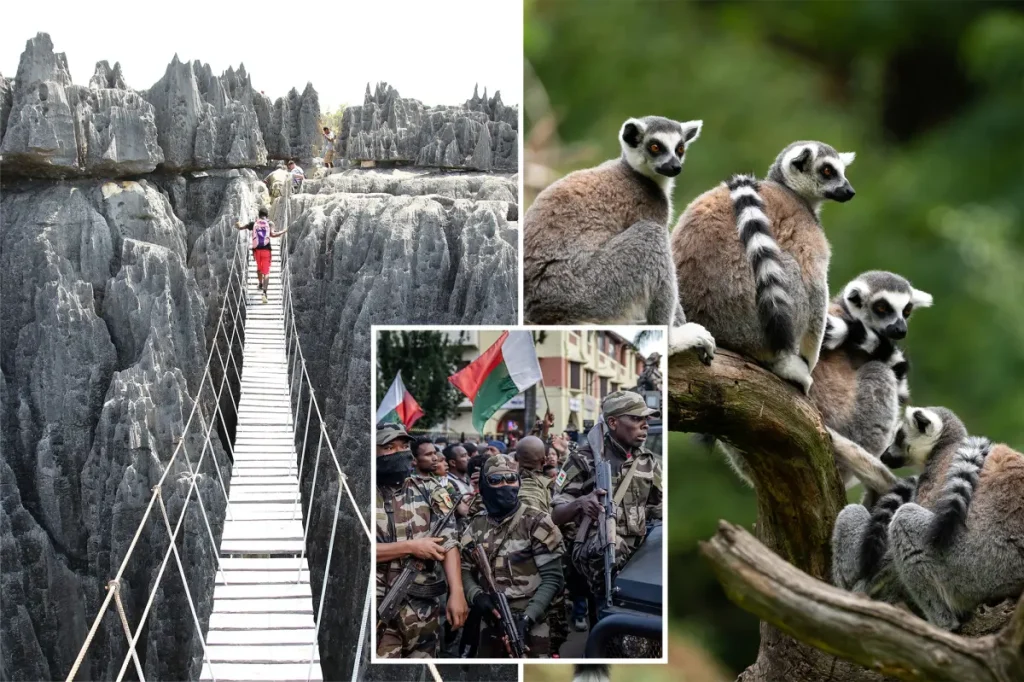Madagascar Travel Advisory: Rising Concerns Amid Political Unrest and Safety Challenges
Madagascar, the stunning island nation known for its unique biodiversity and natural wonders, is currently facing a period of significant unrest that has prompted the U.S. State Department to issue an elevated Level 3 travel advisory, urging travelers to “Reconsider Travel.” The advisory, updated on September 27, highlights growing concerns about “crime and unrest” across the country, painting a complex picture of a destination that typically draws nature enthusiasts and adventure seekers. This development comes at a challenging time for Madagascar, as the nation grapples with political instability following a recent military coup when parliament voted to impeach President Andry Rajoelina, who has reportedly fled the country. The situation represents a significant shift for a country that has long been celebrated for its exceptional natural heritage rather than political turbulence.
The advisory specifically warns about demonstrations occurring throughout Madagascar that can “turn violent without warning,” creating unpredictable situations for visitors and locals alike. U.S. citizens are strongly advised to “stay in place and avoid areas with protests or demonstrations” due to the volatile nature of these gatherings. The State Department notes that protesters have been engaging in rioting, looting, vandalism, and destruction of property, particularly after nightfall when “sporadic protests may develop quickly.” These sudden eruptions of civil unrest present serious safety concerns for travelers who might find themselves unexpectedly caught in dangerous situations with limited options for immediate assistance or evacuation. The heightened risk of becoming an unintended victim during these demonstrations underscores the importance of maintaining situational awareness and avoiding areas where large crowds are gathering.
Beyond the political unrest, the travel advisory points to a troubling rise in violent crime throughout Madagascar, particularly after dark. Of specific concern are the Dahalo, criminal gangs notorious for cattle theft, who are increasingly clashing with security forces in areas south and west of the capital, Antananarivo. The severity of these confrontations was tragically illustrated in 2022 when at least 32 people were killed north of the capital after Dahalo members set homes ablaze, according to Reuters reports from that time. The advisory also highlights the risk of armed robbery and assault, which can occur not only in remote areas but also along major national roads, suggesting that travelers face potential dangers even when moving between destinations on established routes. These security challenges represent a significant concern for visitors who might be unfamiliar with local danger zones or lack the resources to ensure their safety in rapidly evolving situations.
This deteriorating security situation presents a stark contrast to Madagascar’s international image as a paradise for nature lovers and explorers. The island nation has long been celebrated for its extraordinary biodiversity, featuring rainforests, canyons, and caves that house some of the world’s most unique flora and fauna. Perhaps most famously, Madagascar is home to over 110 species of lemurs, according to the International Union for Conservation of Nature, making it a bucket-list destination for wildlife enthusiasts and conservationists. The country’s exceptional natural heritage, with approximately 90% of its wildlife found nowhere else on Earth, has historically been its primary attraction, drawing visitors willing to endure sometimes challenging travel conditions to witness its ecological marvels. Now, however, these natural wonders are overshadowed by security concerns that require travelers to carefully weigh their desire for exploration against potential risks.
The State Department’s travel advisory system, which consists of four levels ranging from “Exercise Normal Precautions” (Level 1) to “Do Not Travel” (Level 4), places Madagascar at Level 3, indicating that Americans should “Reconsider Travel” to the country. This classification sits just below the most severe warning and represents a significant caution flag for potential visitors. The current advisory effectively communicates that while travel to Madagascar isn’t absolutely prohibited, the risks are substantial enough to merit serious reconsideration of travel plans. For context, this places Madagascar in the same risk category as countries experiencing various forms of civil unrest or elevated crime rates, highlighting the seriousness with which the State Department views the current situation. The decision to issue this elevated advisory wasn’t taken lightly and reflects genuine concerns about the ability to ensure the safety of American citizens in the current environment.
For travelers who have dreamed of experiencing Madagascar’s extraordinary landscapes and wildlife, the current advisory presents a difficult dilemma. The island’s remarkable biodiversity—including its famous baobab trees, stunning limestone formations, and diverse ecosystems—continues to exist amid the turmoil, but accessing these natural wonders now comes with significantly elevated risks. Those who decide to proceed with travel plans despite the advisory should consider implementing extensive safety precautions, including registering with the State Department’s Smart Traveler Enrollment Program (STEP), maintaining regular contact with the U.S. Embassy, avoiding all demonstrations, limiting night travel, and perhaps most importantly, remaining flexible with itineraries in case rapid changes become necessary. Madagascar’s current challenges remind us that even the world’s most beautiful destinations can experience periods of instability that fundamentally alter the travel calculus, requiring visitors to balance their sense of adventure with a realistic assessment of potential dangers.


